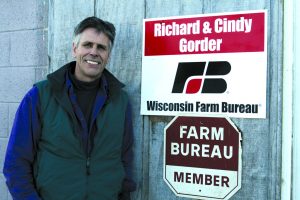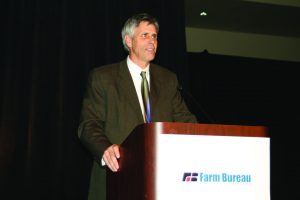 The year was 1979. Little did Richard Gorder know an invite from his neighbor to a hayride with other young farmers would lead to a seat on the Wisconsin Farm Bureau Board of Directors, seven years as its vice president, and several hundred meetings representing Farm Bureau and Wisconsin agriculture.
The year was 1979. Little did Richard Gorder know an invite from his neighbor to a hayride with other young farmers would lead to a seat on the Wisconsin Farm Bureau Board of Directors, seven years as its vice president, and several hundred meetings representing Farm Bureau and Wisconsin agriculture.
Gorder represents six southwestern Wisconsin counties for Farm Bureau’s District 3. He farms with his wife, Cindy, on a 200-acre, 60-cow dairy farm east of Mineral Point in Iowa County. Cindy owns and operates a graphic design business called Homegrown Graphics. In 2000 they modernized the dairy, building a free-stall barn for 70 cows, and retrofitting the traditional stanchion/tie-stall barn with a step-up parlor. The changes allowed Gorder the ability to pursue his other passion, agriculture advocacy.
Gorder relishes the advocacy opportunities Farm Bureau has offered him. He has become a vigilant voice for common-sense environmental rules and regulations. Over the last decade he has served on many committees, task forces and councils pertaining to Wisconsin’s non-point rules and regulations.
“Farmers have a tendency of minding their own business and not feeling comfortable expressing themselves in public,” said Gorder. “Farmers need an advocate in these meetings to explain what works and won’t work in the everyday environment of the working farm. It’s been my experience that regulations should come with an advisory label that says ‘batteries not included’ as there is little thought of how laws and regulations will be implemented or the cost associated with implementation.”
 Gorder gives credit to former and current WFBF presidents Dan Poulson and Bill Bruins for affording him a wide range of opportunities. In 2003 Gorder was selected to represent Wisconsin on the American Farm Bureau’s Making American Agriculture Productive and Profitable (MAAPP) task force. The committee’s responsibility was to look at the future of agriculture and what policies would be needed to ensure agriculture’s ability to compete in the world market in 2019 and beyond.
Gorder gives credit to former and current WFBF presidents Dan Poulson and Bill Bruins for affording him a wide range of opportunities. In 2003 Gorder was selected to represent Wisconsin on the American Farm Bureau’s Making American Agriculture Productive and Profitable (MAAPP) task force. The committee’s responsibility was to look at the future of agriculture and what policies would be needed to ensure agriculture’s ability to compete in the world market in 2019 and beyond.
“The MAAPP experience was truly a once in a lifetime event,” he said. “It gave me the opportunity to see agriculture from different parts of the country and understand the challenges that others face. After two years and 15 meetings we put forward a document that is very relevant today. We could see government continuing to be involved in agriculture, just not in the traditional role.”
Gorder says that could mean a greater emphasis placed on food safety, nutritional, environmental and risk management options and less with the income side.
While Gorder has testified at numerous legislative and agency hearings, it is the two times he has been asked to testify before Congress on dairy policy in 2000 and 2001 that stand out.
“It’s not everyday you get invited to testify before Senate committees,” he remarked.
In 2000 he testified before the Senate Agriculture Committee on dairy policy and the inequities directed toward the upper Midwest. In 2001 he was invited to speak before the Senate Judiciary Committee on the impact of the Northeast Dairy Compact toward states outside of the compact region.
“Sitting there in front of Senators like Patrick Leahy of Vermont and Charles Schumer of New York is at best intimidating,” he said. “There is little that can intimidate me today after that experience.”
Today Gorder continues his involvement representing Farm Bureau on the state Biomass Energy Council as well as the Discovery & Pioneer Farms steering committee and wherever needed.
“We need to continue to tell agriculture’s story, our story,” he said. “We need to be that advocate for what really happens on our farms.”
Finally, he has advice for anyone who might find themselves invited to a Farm Bureau hayride.
“Go, it may change your life,” he said.
Story by Casey Langan. Original version appeared in the February/March 2011 issue of Wisconsin Farm Bureau Federation’s Rural Route.


Leave a Reply